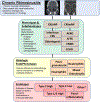Current insight into treatment of chronic rhinosinusitis: Phenotypes, endotypes, and implications for targeted therapeutics
- PMID: 35469844
- PMCID: PMC9673979
- DOI: 10.1016/j.jaci.2022.04.013
Current insight into treatment of chronic rhinosinusitis: Phenotypes, endotypes, and implications for targeted therapeutics
Abstract
Chronic rhinosinusitis is characterized by persistent locoregional mucosal inflammation of the paranasal sinuses and upper airway that has substantial associated health care costs. Personalized approaches to care that incorporate use of molecular biomarkers, phenotypes, and inflammatory endotypes is a major focus of research at this time, and the concurrent rise of targeted therapeutics and biologic therapies has the potential to rapidly advance care and improve outcomes. Recent findings suggest that improved understanding of chronic rhinosinusitis phenotypic and endotypic heterogeneity, and incorporation of these characteristics into clinical care pathways, may facilitate more effective selection of surgical and/or therapeutic interventions. Ultimately, these personalized approaches have the potential to target specific inflammatory pathways, increase efficacy, reduce costs, and limit side effects. This review summarizes recent advances in the identification and characterization of chronic rhinosinusitis phenotypes, endotypes, and biomarkers and reviews potential implications for targeted therapeutics.
Keywords: Endotypes; biologics; biomarkers; cytokines; phenotypes; rhinosinusitis.
Copyright © 2022 American Academy of Allergy, Asthma & Immunology. Published by Elsevier Inc. All rights reserved.
Conflict of interest statement
Disclosure of potential conflicts of interest: The remaining authors declare that they have no relevant conflicts of interest.
Figures

References
-
- Ta NH, Gao J, Philpott C. A systematic review to examine the relationship between objective and patient-reported outcome measures in sinonasal disorders: recommendations for use in research and clinical practice. Int Forum Allergy Rhinol. May 2021;11(5):910–923. doi:10.1002/alr.22744 - DOI - PMC - PubMed
Publication types
MeSH terms
Substances
Grants and funding
LinkOut - more resources
Full Text Sources
Medical

